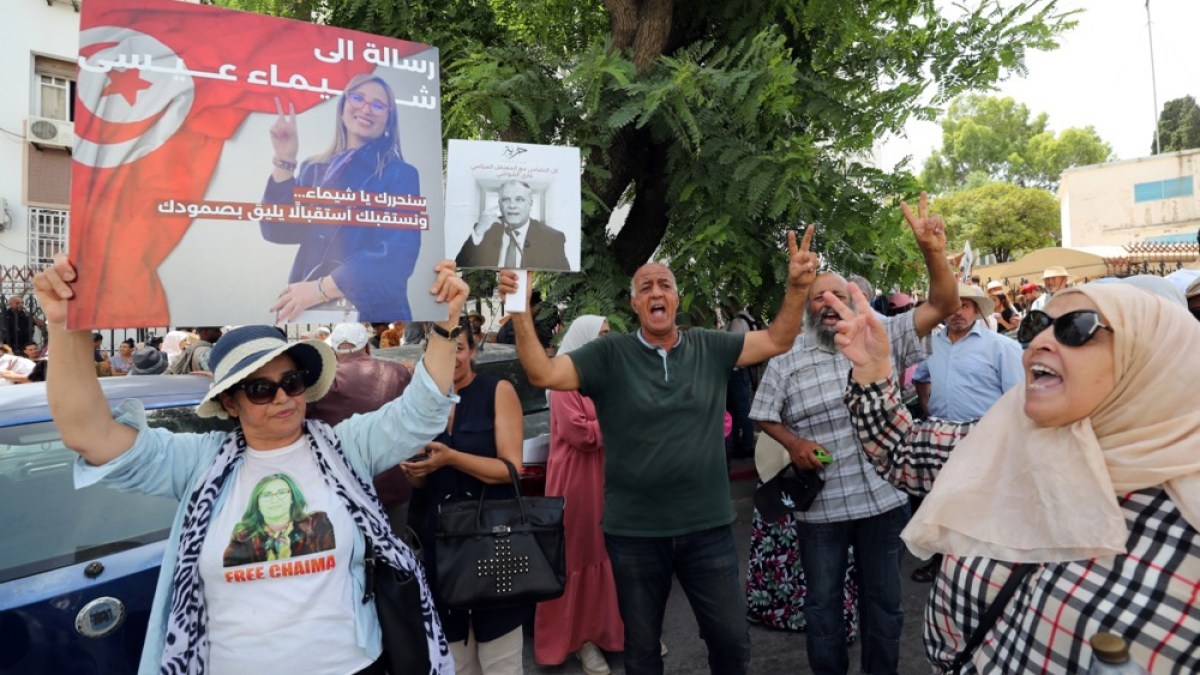Tunisian judge frees two leading opponents of President Saied
Chaima Issa and Lazhar Akremi released nearly 5 months after arrest for allegedly conspiring against state security.
A Tunisian judge freed two prominent political opponents of President Kais Saied, nearly five months after they were arrested on suspicion of plotting against state security, their lawyer Monia Bouali told the Reuters news agency.
Chaima Issa and Lazhar Akremi were released on Thursday following their detention in February along with 20 other political leaders in a crackdown on the country’s opposition. Both were charged with “conspiracy against state security”.
Issa is a leader in the Salvation Front, the main opposition coalition to Saied which has organised protests against him over the past two years. Akremi, a lawyer who served as a minister after Tunisia’s 2011 revolution, has been a prominent critical voice against Saied.
Before the judge’s verdict, dozens of prisoners’ families protested near the court in Tunis, holding up pictures of the detainees and calling for their release.
After her release from prison, Issa chanted, “Down with the coup. Down with Kais Saied”.
“The injustice against the rest of the prisoners must end … Imprisoning the dissidents will not solve Tunisia’s problems,” Issa told Reuters.
first comment by Chaima Issa, the prominent political opponent of Kais Saied, in response to a @Reuters question, immediately after she was released from prison#Tunisia pic.twitter.com/TPP75YT9sm
— Tarek Amara (@amara_tarek) July 13, 2023
“I paid the price, but we must continue,” she added.
The defence team for Issa and Akremi said in a statement that the investigating judge decided to “release Chaima Issa and also responded to the defence committee’s request for the release of Lazhar Akremi”.
The appeal court judge rejected the team’s request for the release of other political opponents.
The main opposition parties have decried their leaders’ arrests as politically motivated, and rights groups have urged authorities to free the detainees.
Saied has described them as “terrorists” and traitors and says judges who free them would be abetting their alleged crimes.
Saied froze parliament and sacked the government in a dramatic July 2021 move against the sole democracy to emerge from the Arab Spring uprisings. He ruled by decree from September 2021 to March 2023, which he claimed was necessary to save the country from chaos and corruption.
His critics have dubbed the move a “coup” while human rights groups have condemned a “witch hunt” aimed at “repressing” freedom of opinion in the North African country.
In addition to the political crisis triggered by Saied’s power grab, Tunisia has been shaken by a serious financial crisis and is in search of foreign aid.
On Wednesday, European parliamentarians expressed their opposition to any “unconditional agreement” between the European Union and Tunisia, citing “the excesses” of Saied.
They called on the Tunisian authorities to “release arbitrarily imprisoned opponents, defend the rights of Tunisian citizens and support their struggle for democracy”.



